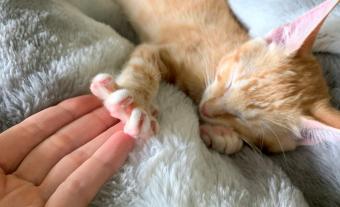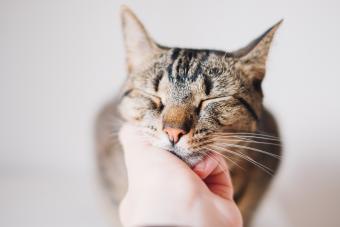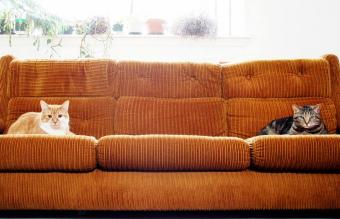
Cats do some pretty cute things, but one of their most adorable behaviors is reaching out their paw toward their human companions. You've probably found yourself wondering why your cat reaches out their paw to you like this. There's usually a wholesome explanation for this behavior, though it can also occasionally be a cause for concern.
Why Do Cats Reach Their Paws Out?
Cats are complex, and everything they do has multiple potential causes. To understand why your cat is reaching their paw out to you, you need to look at their overall behavior and body language. This can provide valuable clues to decipher what they're trying to tell you.
1. Your Cat Is Simply Stretching
Sometimes, cats just need to limber up before they lie down. Napping and resting are serious business, after all. If your cat looks relaxed and fully extends a paw or two, this means they are probably stretching their muscles (especially if they yawn, too). It's pretty obvious in most cases. This is a sign of a happy, contented cat who's enjoying themselves.
Cats will only stretch out and show you their belly when they feel completely safe in your presence.
2. Reaching Paws May Indicate Attention Seeking
If your cat walks up to you and extends a paw, this could mean they're looking for attention. Observe their body language and any vocalizations they make to determine what they want.
If they look calm and are purring, it might be that they want to jump up on the couch with you and enjoy some snuggle time. Or, if their body language looks excited and energetic, they might be telling you that they want you to pull out one of their cat toys and engage in some playtime.
3. It's a Sign of Physical Affection

Some cats will reach a paw out to you while they're snuggling with you in bed or on the couch. If they're already enjoying affectionate time with you, reaching their paw out to you is just another sign that they love your company and want to get close to you.
One thing cat owners may not realize is that cats actually have poor close-up vision. Because of this, they may stretch their paw out to touch you because they can't see as well when you're cuddling together. The act of reaching their paw out to you makes them feel more secure that you're "there" and with them.
4. They're Leaving Their Scent
Cats have scent glands in their paws, and they may be attempting to "claim you" with their scent by reaching out to you with a paw. This behavior is more often seen with head butting and rubbing, as cats also have scent glands in their cheeks and forehead. Cats will mark their owners with their scent as a way to show social affiliation with you, which is a sign they enjoy being part of your family.
5. Reaching Paws May Be a Precursor to Kneading
Kneading, or "making biscuits," is a behavior that contented cats do with their owners. They basically move their paws back and forth on you, and this usually is accompanied by extreme purring. Sometimes when a cat reaches out just one paw to you, this is the first step before they move into full kneading action.
6. It Can Be a Sign of Hunger
Some cats will learn through observation and repetition that they can solicit food from you by reaching out their paws. If your cat comes up to you and reaches out their paw while meowing, and it's around the time of day when they get their meals, this may mean they are hungry.
If you get up to feed them each time they do this, a cat can learn that this body motion can get them dinner. Cats will also touch you with their paw to wake you up in the morning for the same reason, especially if they're successful in regularly getting you out of bed to feed them.
7. It Could Indicate Pain
While paw reaching is most often a benign behavior, a cat can also do it if they're in pain. If a cat hurts their paw, such as cutting it or pulling a muscle, they may come up to you and extend it as a way to ask for help.
If your cat appears stressed and you notice limping, swelling, or bleeding, take their paw gently in your hands and examine it for wounds. It's best to give your veterinarian a call and bring your cat in if the problem persists or if they have a wound that needs treatment.
There are also certain illnesses that will lead to limping, such as feline calicivirus, which causes "limping syndrome" in young kittens.
Cats Reach Out to Communicate With You
If your cat reaches their paw out to you, it's usually easy to decipher what they're trying to tell you based on the context and how they act. Take heart that this is most often a way a cat shows affection and interest in you. It's only a cause for concern if your cat is reaching out their paw and appears sick or in pain, in which case you should get them to a veterinarian to check for injuries or possible internal illnesses.







